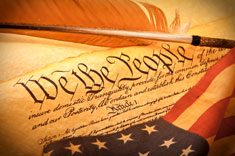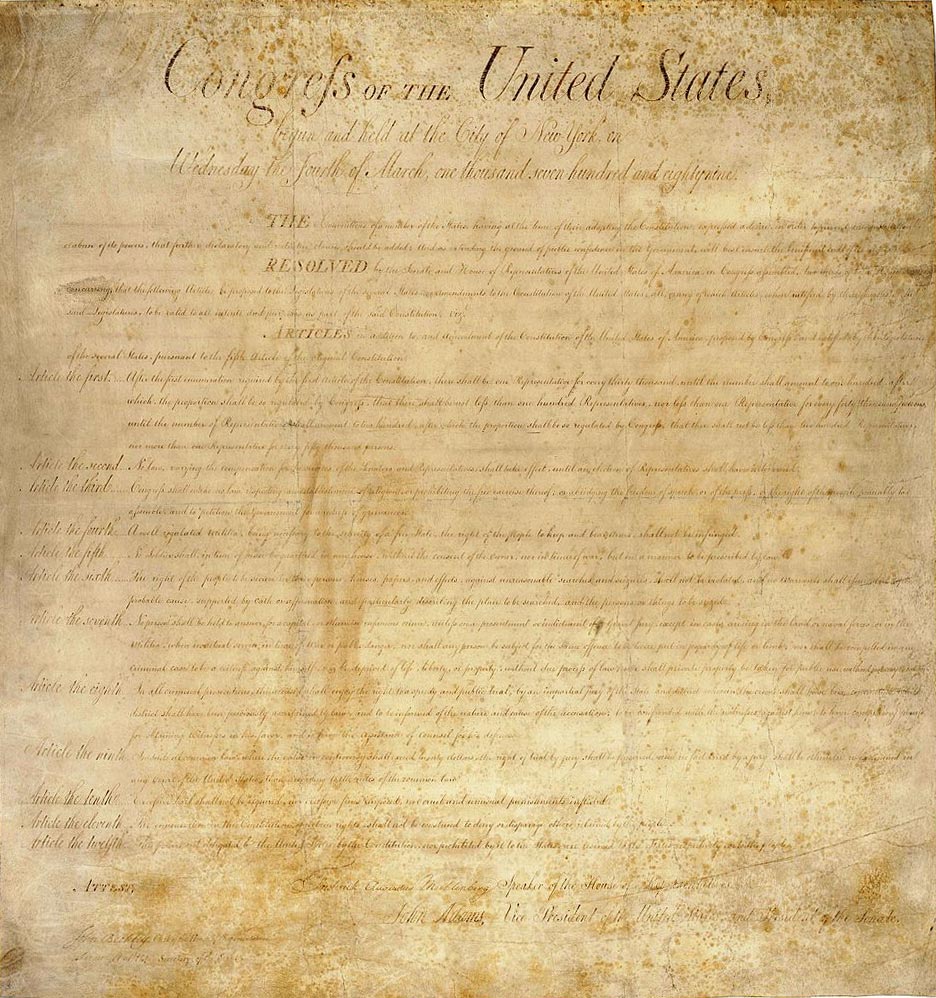| United States Constitution | |
|---|---|
 |
|
| The U.S. Constitution | |
| Preamble | |
| Articles of the Constitution | |
| I ‣ II ‣ III ‣ IV ‣ V ‣ VI ‣ VII | |
| Amendments to the Constitution | |
| Bill of Rights | |
| I ‣ II ‣ III ‣ IV ‣ V ‣ VI ‣ VII ‣ VIII ‣ IX ‣ X | |
| Additional Amendments | |
| XI ‣ XII ‣ XIII ‣ XIV ‣ XV ‣ XVI ‣ XVII ‣ XVIII ‣ XIX ‣ XX ‣ XXI ‣ XXII ‣ XXIII ‣ XXIV ‣ XXV ‣ XXVI ‣ XXVII | |
| View the Full Text | |
| Original Constitution | |
| Bill of Rights | |
| Additional Amendments |
The Third Amendment is part of the U.S. Bill of rights, which was introduced on September 5, 1789. Three quarters of the States ratified this amendment alongside nine others on December 15, 1791. It forbids, in wartime or peacetime, quartering of soldiers in private homes without permission from owners. This means that American citizens are protected from forceful feeding and accommodating of government troops. Though this law was very important to the founding fathers in the time of its draft, it is not very significant in modern America.
Text
No Soldier shall, in time of peace be quartered in any house, without the consent of the Owner, nor in time of war, but in a manner to be prescribed by law.
History of the 3rd Amendment
Quartering of soldiers in America had started soon after the end of French-Indian War in 1763. The Colonial government’s Parliament had decided to maintain a constant supply of their soldiers in American colonies for defense against more French and Indian uprisings.
 A few years before the American Revolution, private citizens were forced to accommodate troops in their own homes. Since there was much tension between the colonial citizens and the British soldiers, the founding fathers did not want this unpleasant situation to recur in future.
A few years before the American Revolution, private citizens were forced to accommodate troops in their own homes. Since there was much tension between the colonial citizens and the British soldiers, the founding fathers did not want this unpleasant situation to recur in future.
First Quartering Act
The first Quartering Act was endorsed on May 15, 1765 after the Boston Tea Party. The Act demanded that British armed forces be housed in garrisons and public inns, but in case the space was not enough in these two places, other buildings that belonged to the citizenry including barns, uninhabited buildings and stables could be used. In addition to that, owners of those properties were to pay for food for the soldiers and would not be compensated for the utilization of the properties.
There was much resistance by the colonists, especially in New York. In fact, violence broke out between the colonists and the British army because New York declined to collaborate with the act. This Quartering Act expired in 1770 and was not renewed.
Second Quartering Act
An extra Quartering Act was voted for on June 2, 1774 by the Parliament and was part of succession of acts that the colonists called the Intolerable-Acts. The 2nd act gave the colonial Royal Governors rights to quarter troops on private properties but not in occupied ones. This would only happen if the public properties available were not enough. Once again, the colonists opposed the idea of their private properties being used without their permission. However, this act generated the least opposition among all the Intolerable-Acts. This act expired on March 24, 1776.
Creating the 3rd Amendment
After witnessing the government using their private properties without their consent, the founding fathers demanded for an assurance that this would not happen again in future. Many people were not convinced that the amended constitution would protect their rights adequately and therefore demanded for the Bill of Rights to be included. The Bill of Rights was immediately included to clarify the citizens’ rights, so that government officials would not continue tampering with their rights. When the States started to debate on the proposed constitution, it was made clear that it would not be passed without shifting the minds of the critics.
Those who supported the constitution (Federalists) wanted a powerful central government since the one that was in charge could barely function. On the other hand, those who opposed the constitution (Anti Federalists) did not want a powerful central or Federal government since they thought that the government would take away the people’s rights.
The Federalists suggested an offer called Massachusetts Compromise, which would convince an adequate amount of Anti Federalists to endorse the constitution. In this compromise, the Federalists pledged that the 1st Congress would consider the amendment that the states had proposed and add the bill of rights if the antagonists would vote for the constitution. Through that, many opponents voted in support of the constitution, and it became law.
A list of twenty amendments was proposed to the 1st Congress in June 8, 1789. Congress debated the amendments and finally sent twelve of them to all states for consideration. Ten of those amendments together with the 3rd Amendment were agreed upon and they were passed as law on December 15, 1791.
Case Law
The 3rd Amendment is among the least cited sections of the American Constitution. Over the years, there have not been major Supreme Court cases relating to violations of the 3rd Amendment. This is due to the fact that the quartering problem has not happened again since the American Revolution.